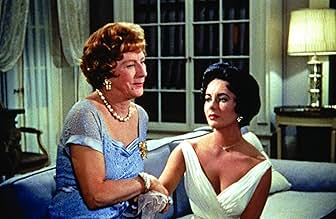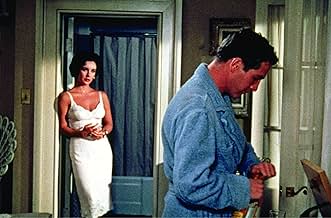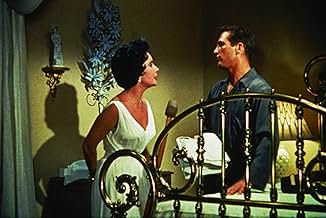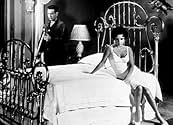Brick is an alcoholic ex-football player who drinks his days away and resists the affections of his wife. A reunion with his terminal father jogs a host of memories and revelations for both ... Read allBrick is an alcoholic ex-football player who drinks his days away and resists the affections of his wife. A reunion with his terminal father jogs a host of memories and revelations for both father and son.Brick is an alcoholic ex-football player who drinks his days away and resists the affections of his wife. A reunion with his terminal father jogs a host of memories and revelations for both father and son.
- Nominated for 6 Oscars
- 3 wins & 16 nominations total
Zelda Cleaver
- Sookey
- (uncredited)
Brian Corcoran
- Boy
- (uncredited)
Hugh Corcoran
- Buster
- (uncredited)
Kevin Corcoran
- Child
- (uncredited)
Patty Ann Gerrity
- Dixie
- (uncredited)
Bobby Johnson
- Pollitt Groom
- (uncredited)
Walter Merrill
- Party Guest
- (uncredited)
Deborah Miller
- Trixie
- (uncredited)
Robert 'Rusty' Stevens
- Sonny
- (uncredited)
Vince Townsend Jr.
- Lacey
- (uncredited)
- Director
- Writers
- All cast & crew
- Production, box office & more at IMDbPro
Storyline
Did you know
- TriviaWhen Paul Newman agreed to play the role of Brick Pollitt, he was under the impression this movie would simply adapt the original script into a screenplay. When the screenplay deviated wildly from the stage text over Tennessee Williams's objections, Newman expressed his disappointment.
- GoofsAfter Brick tries to drive away and gets stuck, Maggie goes out to him and helps him into the house through the pouring rain. Her hair is soaking wet, but the next time she is seen, it's perfectly dry and styled.
- Quotes
Harvey 'Big Daddy' Pollitt: I've got the guts to die. What I want to know is, have you got the guts to live?
- ConnectionsEdited into Hollywood: The Dream Factory (1972)
Featured review
Much has been made of the differences between Tennessee Williams' play and this film--the homoerotic themes have been driven further into subtext (though not eliminated entirely) and a more upbeat ending was added. The changes were necessary when the film was made; although theater and literary purists decry the "sanitizing" or censorship of plays when they are adapted for the screen, in some cases (such as this one) the changes can improve the work in question. "Cat" on film is clearer, for one thing. Tennessee Williams plays tend to be "cluttered" in their original form. They are also cynically downbeat; if that type of story appeals to one, this adaptation might be off-putting.
As with all theatrical adaptations, many of the scenes are excessively talky, especially the Brick/Big Daddy scenes in the second act. Some of the highlights are just as wordy but thoroughly enjoyable rather than tedious (especially Maggie's story about Mae's reign as Cotton Carnival Queen and the entire scene in the basement). All of the performances are excellent, though Paul Newman as Brick is less flashy; it's not really until the basement scene that one feels his talent is given a workout. Elizabeth Taylor is an emotional rollercoaster, venturing from flirtatious to hectoring to wheedling to calm to grasping to tender, often within a single scene, and yet she never slips the rails. Watching films from this period (her career peak), one wonders what happened to turn her into the vague, bleary-eyed woman we see today. Judith Anderson's Big Mama is loud, coarse, and bossy, but completely sympathetic both in the scene with the birthday cake and in the confrontation scene at the end. When Big Daddy invites her along with him at the end, it is every bit as welcome to the viewer as it is to her. Burl Ives is the most towering of all; the emotional growth in the film is as much his as it is Brick's. Jack Carson and Madeleine Sherwood are every bit as good despite being relegated to comic relief at times.
My favorite aspect of this story, however, is the social dynamic. Brick and Maggie are spoiled, young, "beautiful people" who have yet to take on any responsibility, while Gooper and Mae are the epitome of a serious young family. Brick is an alcoholic former football player, while Gooper is a corporate lawyer. Despite these obvious differences, however, both their parents and the audience (and Tennessee Williams, obviously) clearly prefer Brick and Maggie. Every aspect of Gooper and Mae's personalities, even those which bespeak traditional values, are portrayed as petty and unimaginative. Even if one believes that Gooper and Mae have done all the right things, they have done them for the wrong reasons. Thus the theme of the story is most clearly presented: all that is important is to love and to express that love.
As with all theatrical adaptations, many of the scenes are excessively talky, especially the Brick/Big Daddy scenes in the second act. Some of the highlights are just as wordy but thoroughly enjoyable rather than tedious (especially Maggie's story about Mae's reign as Cotton Carnival Queen and the entire scene in the basement). All of the performances are excellent, though Paul Newman as Brick is less flashy; it's not really until the basement scene that one feels his talent is given a workout. Elizabeth Taylor is an emotional rollercoaster, venturing from flirtatious to hectoring to wheedling to calm to grasping to tender, often within a single scene, and yet she never slips the rails. Watching films from this period (her career peak), one wonders what happened to turn her into the vague, bleary-eyed woman we see today. Judith Anderson's Big Mama is loud, coarse, and bossy, but completely sympathetic both in the scene with the birthday cake and in the confrontation scene at the end. When Big Daddy invites her along with him at the end, it is every bit as welcome to the viewer as it is to her. Burl Ives is the most towering of all; the emotional growth in the film is as much his as it is Brick's. Jack Carson and Madeleine Sherwood are every bit as good despite being relegated to comic relief at times.
My favorite aspect of this story, however, is the social dynamic. Brick and Maggie are spoiled, young, "beautiful people" who have yet to take on any responsibility, while Gooper and Mae are the epitome of a serious young family. Brick is an alcoholic former football player, while Gooper is a corporate lawyer. Despite these obvious differences, however, both their parents and the audience (and Tennessee Williams, obviously) clearly prefer Brick and Maggie. Every aspect of Gooper and Mae's personalities, even those which bespeak traditional values, are portrayed as petty and unimaginative. Even if one believes that Gooper and Mae have done all the right things, they have done them for the wrong reasons. Thus the theme of the story is most clearly presented: all that is important is to love and to express that love.
- budikavlan
- Oct 1, 2002
- Permalink
Details
- Release date
- Country of origin
- Language
- Also known as
- Un gato sobre el tejado caliente
- Filming locations
- Metro-Goldwyn-Mayer Studios - 10202 W. Washington Blvd., Culver City, California, USA(studio: made in Hollywood, U.S.A. by)
- Production company
- See more company credits at IMDbPro
Box office
- Budget
- $3,000,000 (estimated)
- Gross worldwide
- $1,872
- Runtime1 hour 48 minutes
- Color
- Aspect ratio
- 1.85 : 1
Contribute to this page
Suggest an edit or add missing content
































